
![]()

“SMEs business sustainability during Global Pandemic”
On 24 August 2021, a webinar titled “Small and Medium-sized Enterprises
(SMEs) Business Sustainability during Global Pandemic” was jointly organised
by UTAR Faculty of Accountancy and Management (FAM) and
Centre for
Entrepreneurial Sustainability (CENTS) via Microsoft Teams.
Invited to be the speaker was Crowe KL Tax Sdn Bhd Tax Executive Director Dr
Voon Yuen Hoong. Dr Voon is a fellow member of ACCA, United Kingdom. She is
also a member of the Malaysian Institute of Accountants (MIA), Chartered Tax
Institute of Malaysia (CTIM) and Financial Planning Association of Malaysia
(FPAM). Besides, she is also a
licensed tax agent.
Dr Voon is involved in tax compliance for both domestic and multinational
clients. Having been in practice since 2003, she has diverse experience in
advising clients on corporate tax, tax incentives, pre-Field Audit, IRB
audit and tax investigation cases.
Her clients include a wide range of private, public listed and
multi-national companies engaged in a variety of industries.

From left: FAM Department of Accountancy lecturer Ezatul Emilia binti
Muhammad Arif (moderator) and Dr Sia
Speaking during the opening remarks, Faculty of Accountancy and Management
Dean Dr Sia Bee Chuan welcomed the participants and said, “Businesses have
been exposed to various challenges during the global pandemic and their
responses to this disruption have impacted their resilience as well as their
chances to overcome this crisis. SMEs are changing their business models in
order to adapt to this changing environment. Service-based industries have
been hit particularly hard. The sharing today is certainly relevant as we
will gain insight on how to approach the situation based on transformation
drivers, readiness to apply digital technology and of course not forgetting
from the accounting perspective that Crowe will provide today.”
She continued, “In UTAR, we believe our students should continue to keep
abreast with the industry needs and relevance as much as we always aimed to
produce graduates who are not only employable and not just work smart but
also street smart which is also the faculty’s mission— to be an outstanding
business and management faculty of educational and professional excellence
with transformative societal impact, nationally and internationally.”

Clockwise, from top left: Ezatul, Dr Sia, Dr Voon and Francisca Yeoh Suet
Yoong (moderator)
Dr Voon began her webinar by sharing the initial stages of the Covid-19
outbreak in Malaysia, the movement control order (MCO) by phase and the
Standard Operating Procedures (SOPs) of MCO which have become a standard
practice to everyone. She said, “The Covid-19 outbreak has hit a lot of
businesses during the MCO period. A lot of businesses were forced to close.
Only permitted activities as announced by the Ministry of International
Trade and Industry (MITI) were allowed to continue business operations. But
unfortunately under the SOP, most of the businesses were not allowed to
operate during the MCO period that is why I say that a lot of businesses
were affected. ”

The initial stages of the Covid-19 outbreak in Malaysia
Sharing the challenges faced by the SMEs in Malaysia, Dr Voon said,
“According to the SME Corp Malaysia 2021, 98.5 per cent of the business
establishments in Malaysia are SMEs. So you can see how important SMEs are
to Malaysia’s economy. They play an important role and most of the SMEs are
micro-sized, we call it ‘Microenterprises’. Out of the 98.5 per cent,
Microenterprises stand about 76.5 per cent.” She then shared the SMEs’
performance in the year 2020 according to the Department of Statistics
Malaysia 2021. She said, “Most of the industries were experiencing a
concession period, which means their performance was not as good as those
days. Even in terms of exports or employment, their result is negative.”

SMEs’ performance in the year 2020



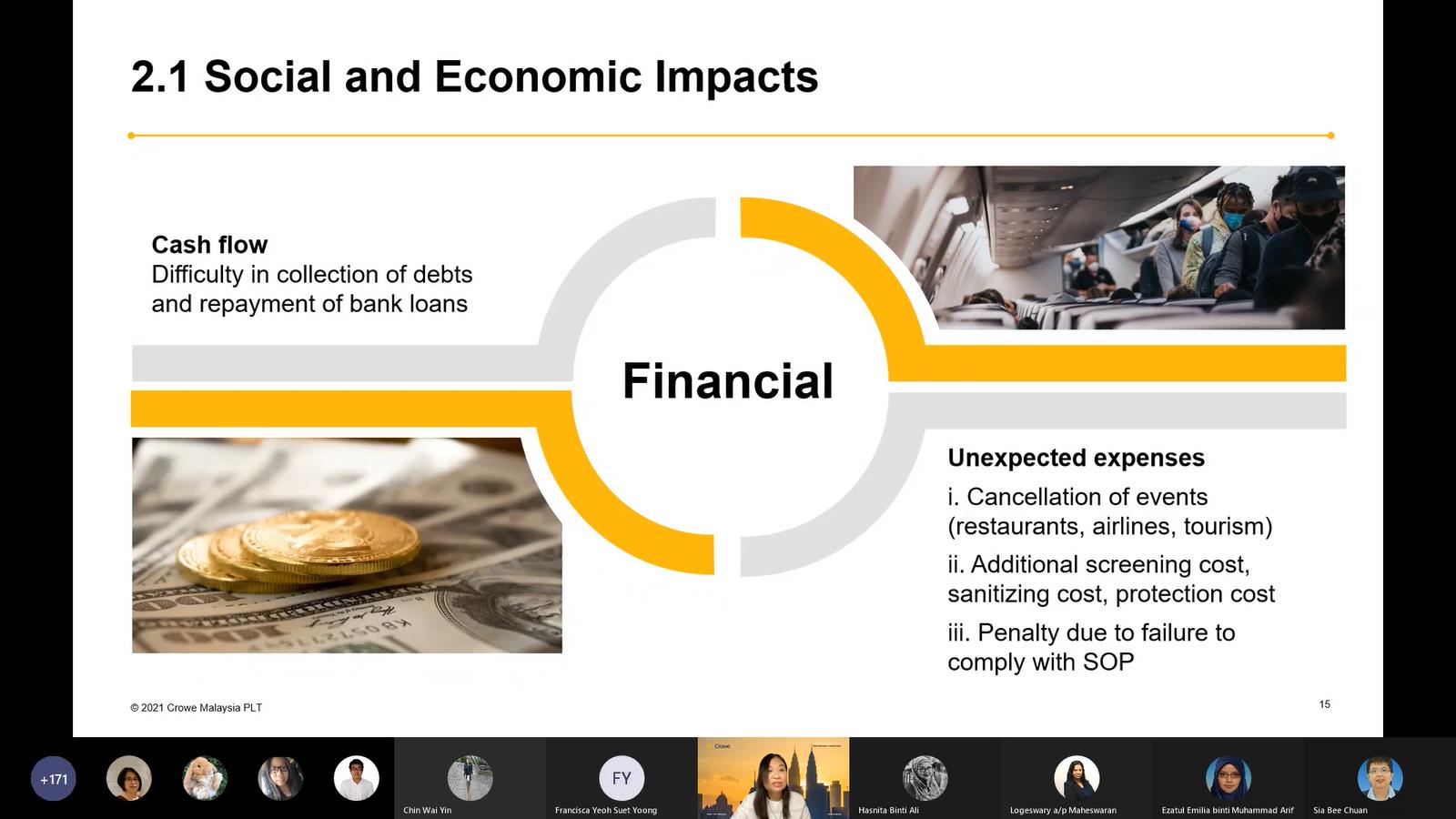
Dr Voon explaining the
social and economic impacts of SMEs
Moving on, she shared the government’s financial measures, and said, “Due to
the many impacts on those businesses out there, our government also
considered the difficulties and challenges faced by the businesses. They
have come out with different measures either financial or tax measures to
assist the businesses. In total, they allocated about RM155.8 billion to
those SMEs whether directly or indirectly via Economic Stimulus Packages and
Budget 2021.”


The timeline of government measures


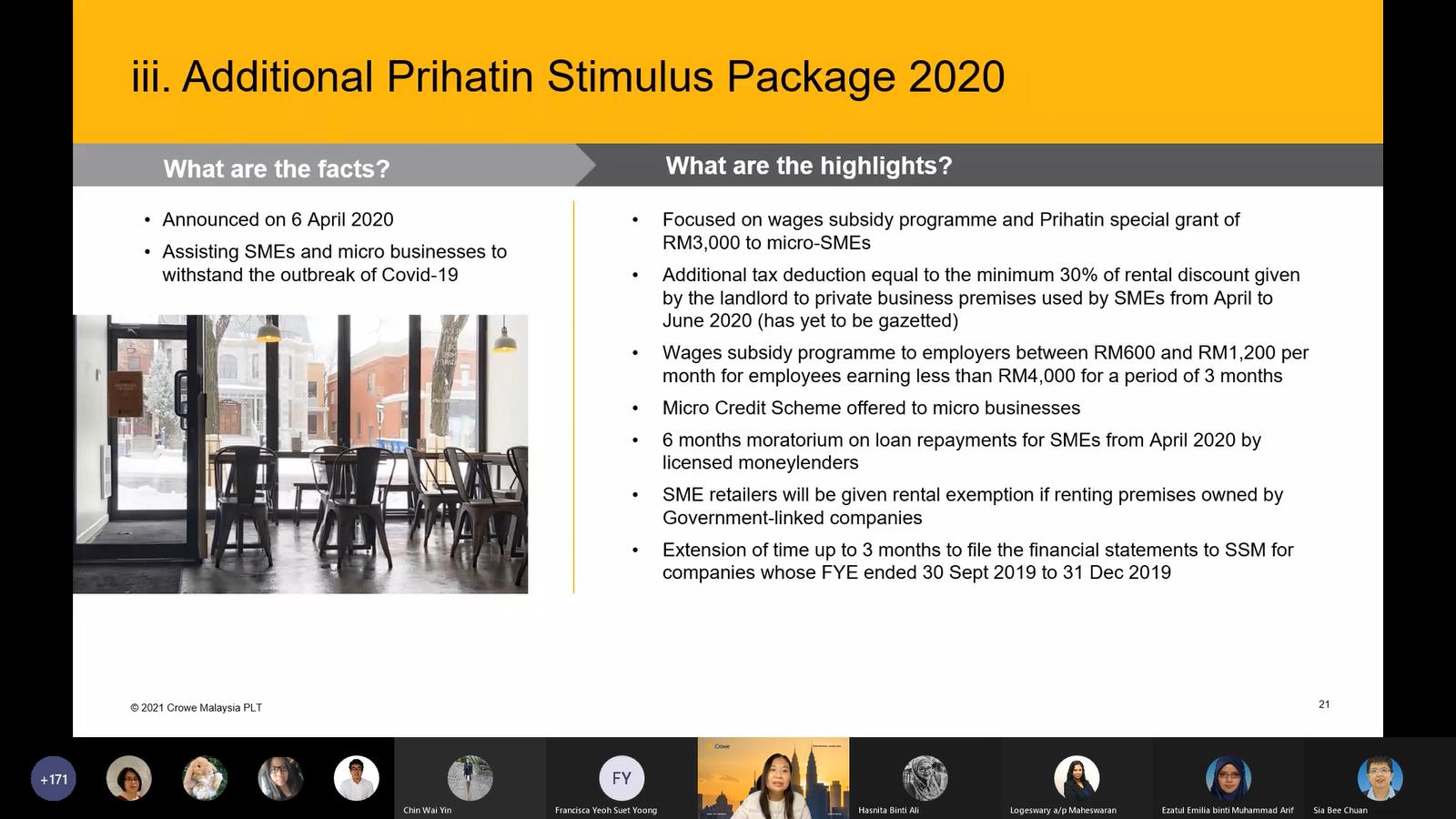
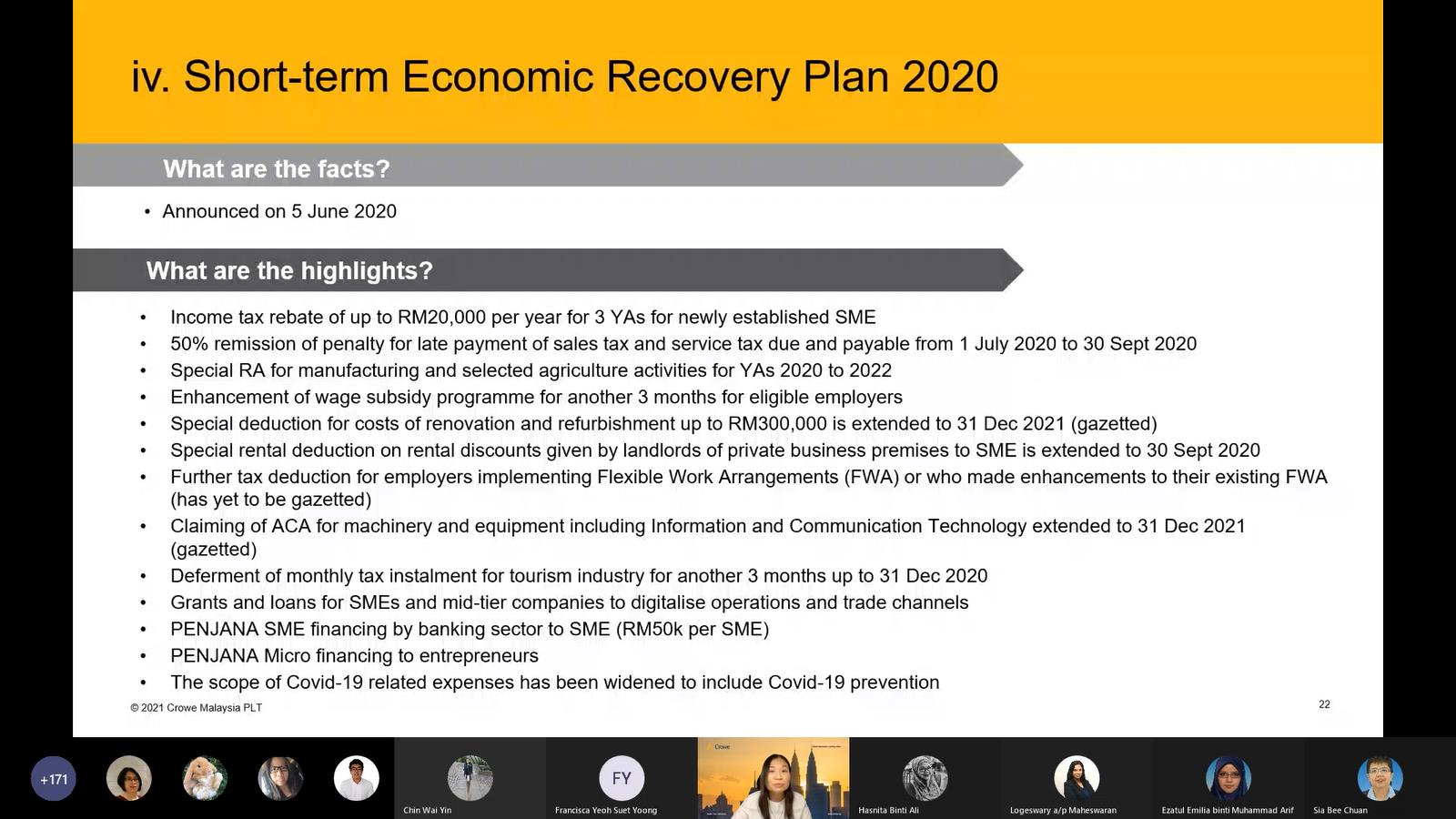
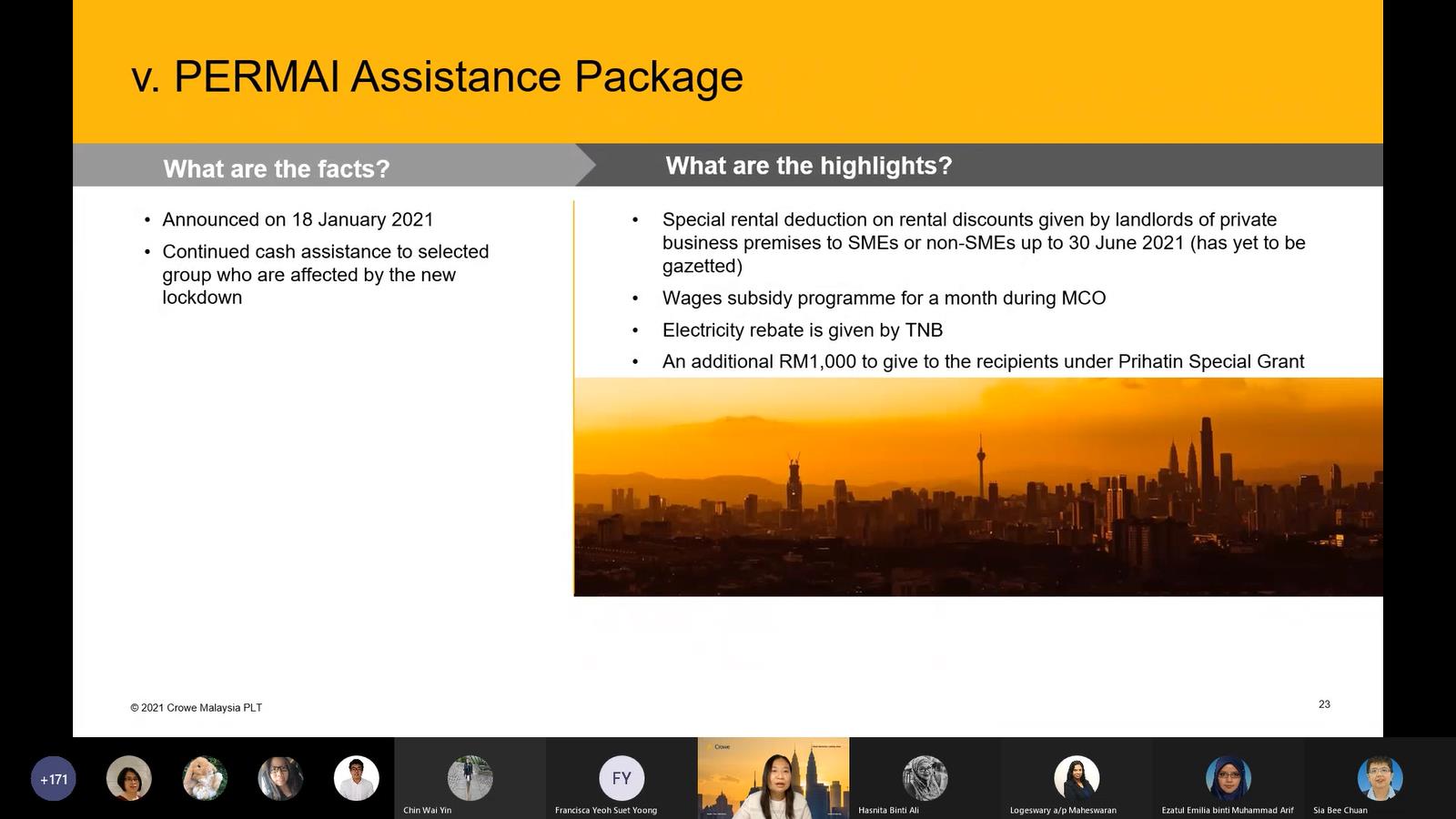
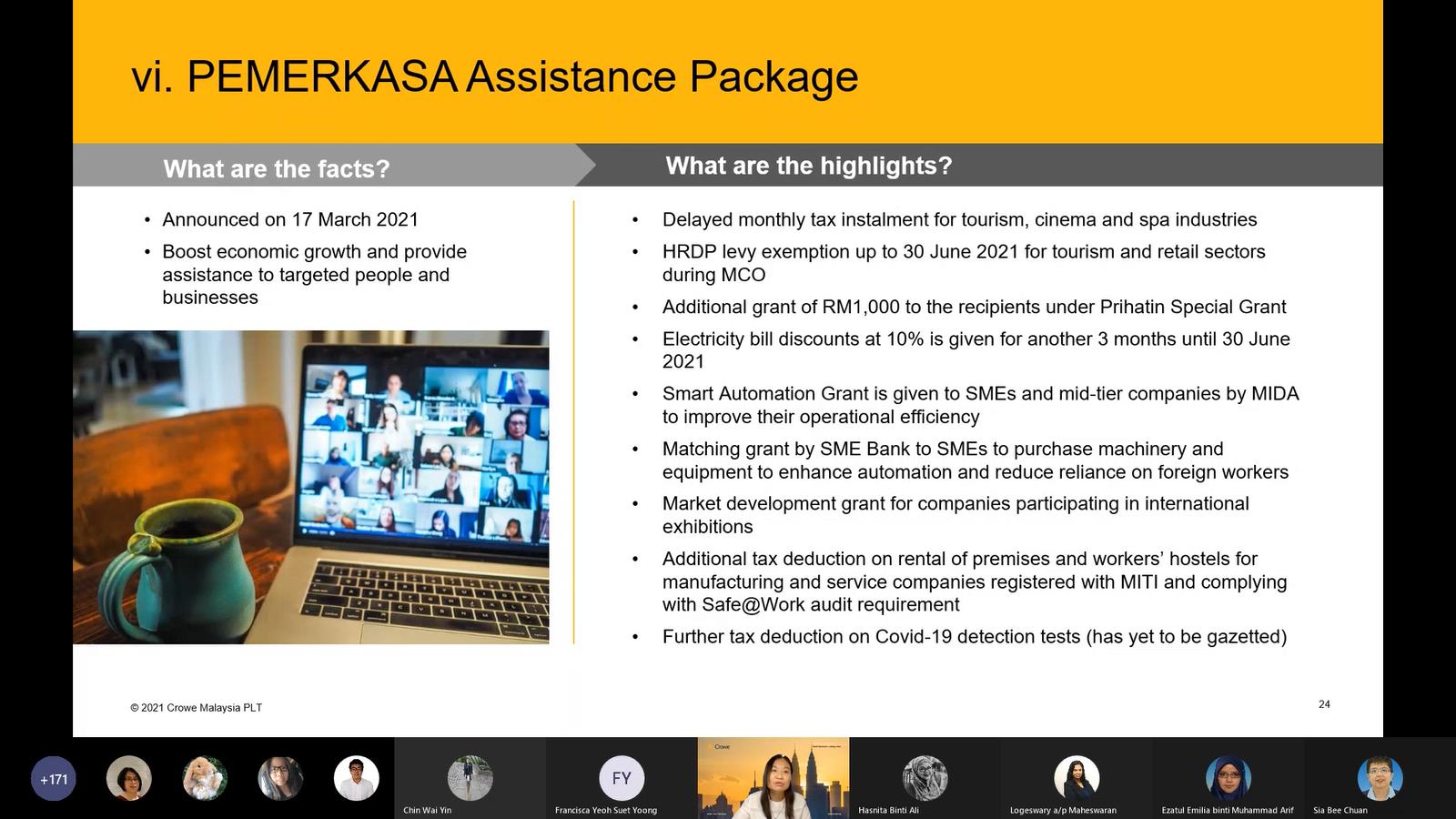
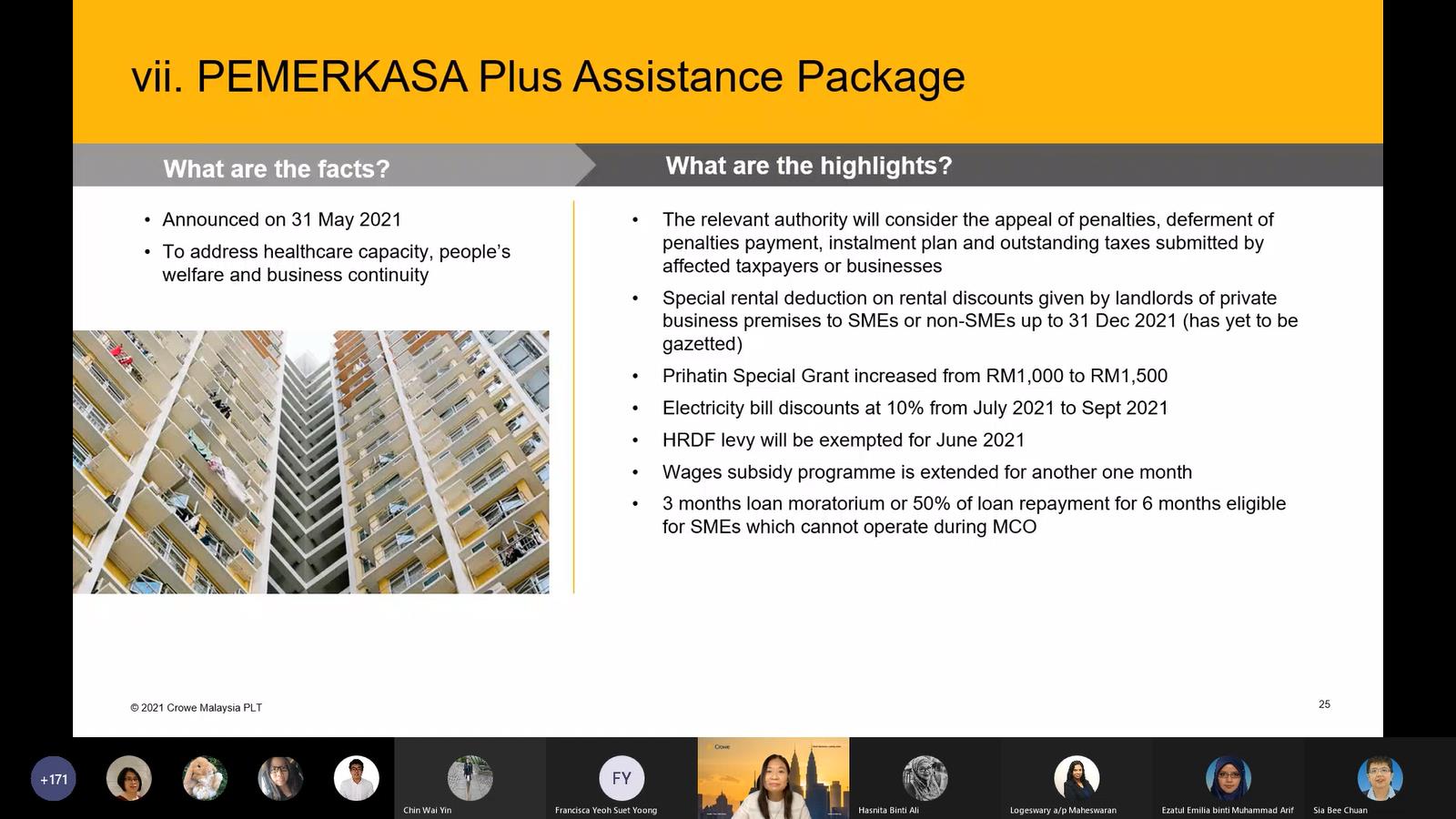
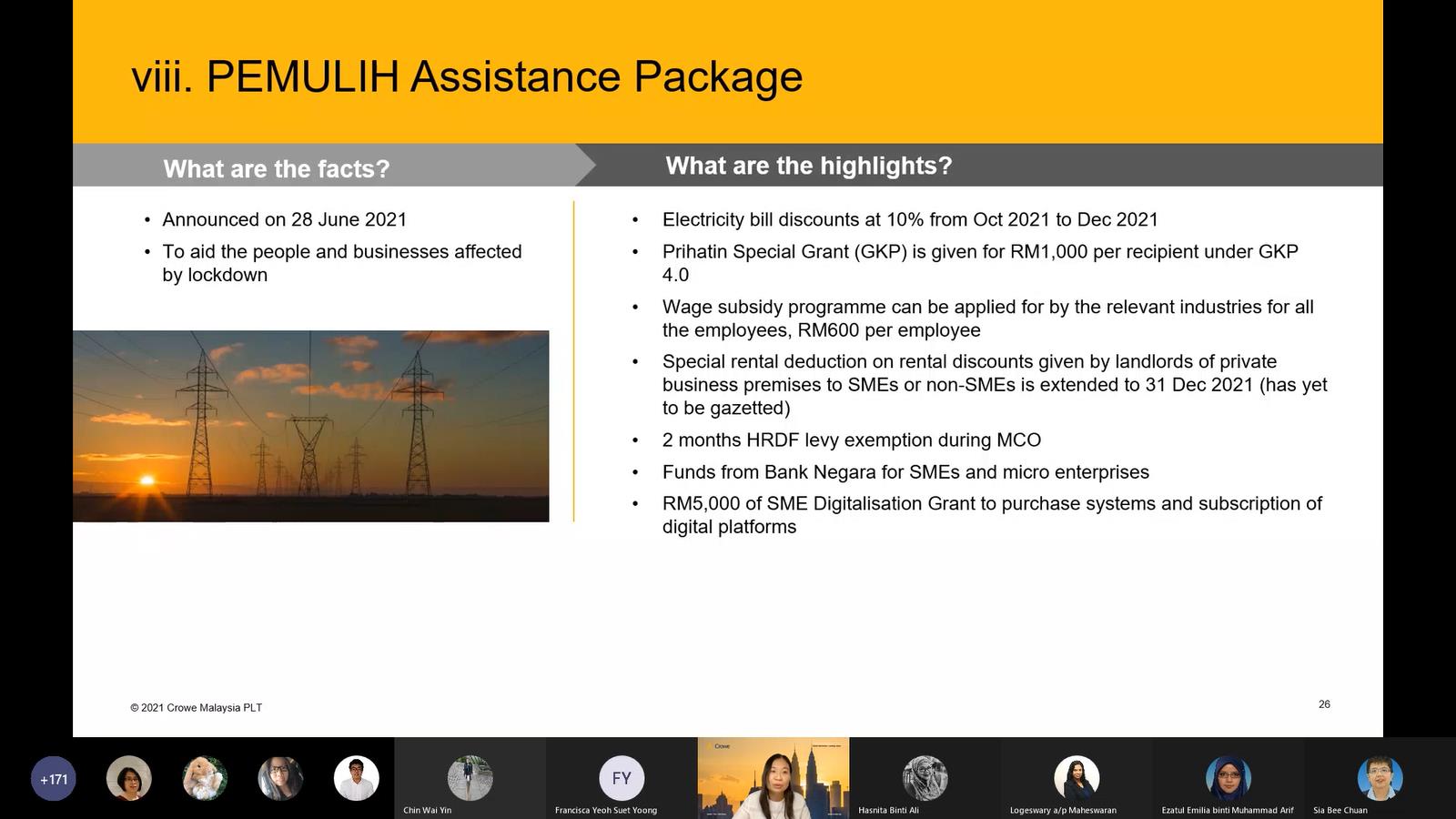
Dr Voon sharing the facts and highlights of the Economic Stimulus Package
She continued to share about the SME loans where the SME owner can consider
applying for loans from a financial institution, or government funding or
grants if they can fulfil the terms and conditions (T&Cs) set by the
government to ease their cash flow burden. She also explained the feature of
BNM’s financing facilities announced by the government to assist Malaysian
SMEs.


SME loans that the SME owners can opt to apply

SME Revitalisation Financing offering by SME Corp

Working Capital Guarantee Scheme offered by the government for SMEs and
non-SMEs that have annual sales of < RM250m
Furthermore, she explained the grant or subsidy offered by the government; the wages subsidy scheme, Prihatin special grant for SME (Geran Khas Prihatin for SME), government stimulus packages and one-off assistance to selected sectors and groups especially the Canteen Operator, Private Kindergarten, Childcare Centre, OKU and Sports Facility Operator who were affected due to the full lockdown.



Grants and subsidies offered by the government
As she addressed the importance of tax measures which is very useful to the
SMEs, she shared about the reinvestment allowance which was specifically
offered to manufacturing and selected agricultural activities (T&Cs apply)
and the tax deduction for costs of renovations and refurbishment under the
exemption order P.U. (A) 381 with the condition that they must get the
certification from a licensed auditor. She also shared the Accelerated
Capital Allowances (ACA) for machinery and equipment, further deductions for
hotel operators for training expenses, tax incentives for flexible work
arrangements (FWA), tax rebate for companies and limited liability
partnerships (LLP) who commenced new business, a special tax deduction for
rental rebates (for SMEs and Non-SMEs) and the Covid-19 related expenses.

List of qualifying expenditures that can be claimed under the special tax
deductions

ACA for machinery and equipment

Further deductions for hotel operators

Tax incentives for FWA

Tax rebate for companies and LLP new business

Special tax deduction for rental rebates for SME and Non-SME

Covid-19 expenses
Sharing on how SMEs benefit from the tax measures under the stimulus
packages, she said, “From the tax compliance perspectives, our government
mentioned that they can defer some instalment plan if they want to pay for
penalty payment or instalment plan for the outstanding tax. So under these
circumstances, they have to estimate the tax payable as precise as they can
to avoid paying excess tax credit to the Inland Revenue Board (IRB) in order
to save on cash flow. Lastly, all the businesses especially the SMEs must
try to comply with all the tax regulations and submit the income tax return
on time although they are not doing well because, for late submissions, the
penalty range is from RM200 to RM200,000 per return.”
“In terms of tax credits, a company can apply for a tax refund but, bear in
mind, that tax refund will take some time. Another option for you is to
request for offset as long as you fulfilled the T&Cs.
Otherwise, you may just keep the tax credits with the IRB if you
don’t have any cash flow problem and offset against your future estimate of
tax payable,” said Dr Voon.
She continued, “Another thing that SMEs can look into is the unutilised
business losses. The cumulative business losses can be used to set up
against the taxable income in the future. Our government actually announced
quite a number of special tax deductions. Try to claim it and keep the
losses but the life span of the tax losses is capped at seven years. You can
keep the tax deduction by now and set off again with the future taxable
income in order to save the cash.” She then listed the deductibility of
business expenses. She added, “If there are any penalties imposed by the
IRB, they allow you to pay in instalment and you can even submit the appeal
letter to the IRB to get the waiver or partial waiver on that.”
She summarised her webinar by giving a recap on the economic stimulus
packages announced by the government and encouraged the SMEs to take a look
at any new policy announced by the government and apply to the relevant
authority to overcome the challenges they face during this pandemic period.

Some measures that can be taken for long term sustainability
The webinar ended with an interactive Q&A session and a group photo session.
A certificate of appreciation was presented by FAM and CENTS to Dr Voon.

A certificate of appreciation to Dr Voon

The webinar attracted more than 200 participants
Wholly owned by UTAR Education Foundation (200201010564(578227-M)) LEGAL STATEMENT TERM OF USAGE PRIVACY NOTICE